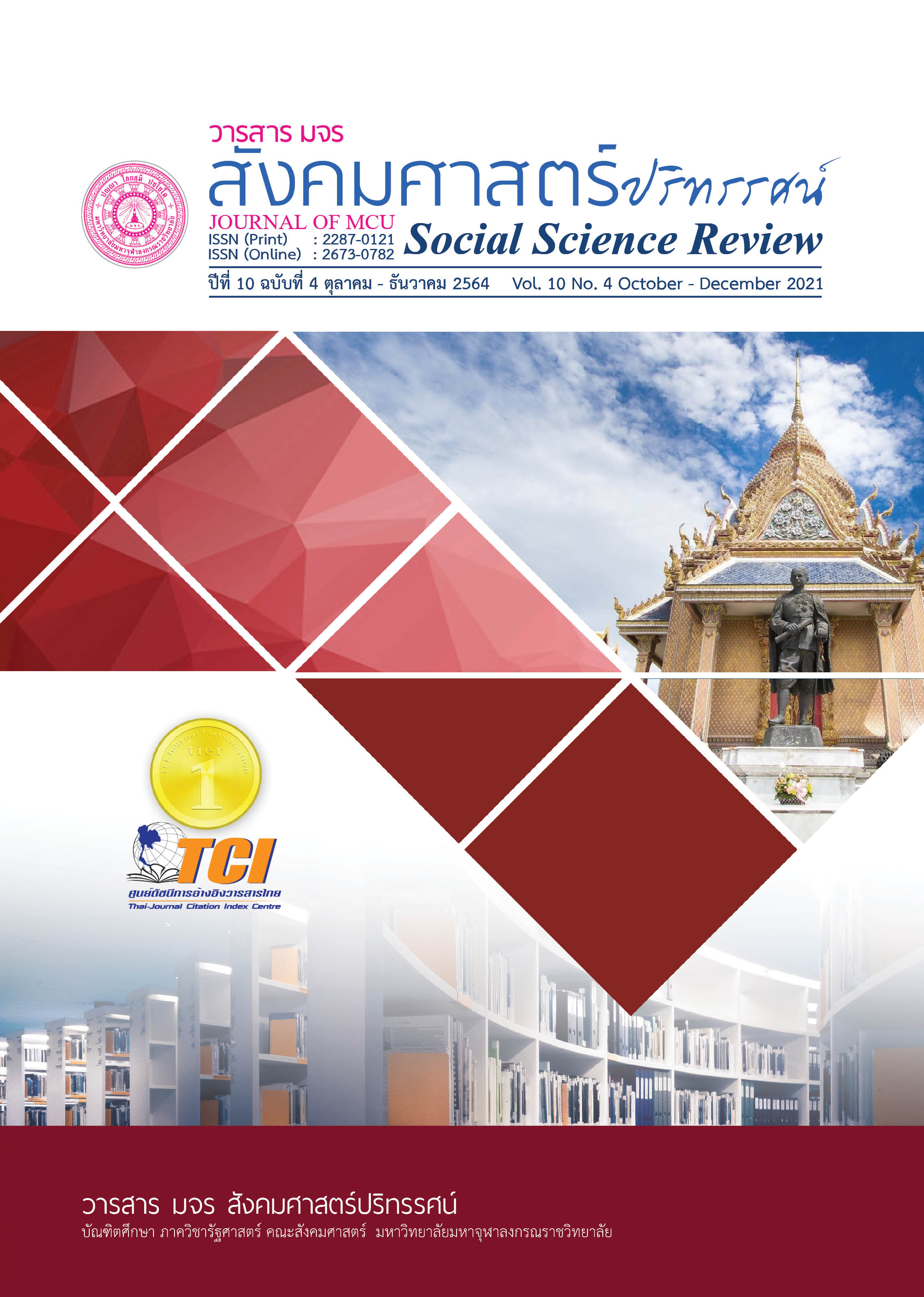พุทธวิธีเพื่อนำไปสู่ความสำเร็จในการบริหารงานขององค์กรปกครองส่วนท้องถิ่น
คำสำคัญ:
การบริหารงาน, พุทธวิธี, องค์กรปกครองส่วนท้องถิ่นบทคัดย่อ
บทความนี้ มีวัตถุประสงค์เพื่อศึกษาพุทธวิธีเพื่อนำไปสู่ความสำเร็จในการบริหารงานขององค์กรปกครองส่วนท้องถิ่น ทั้งนี้เนื่องจากองค์กรปกครองส่วนท้องถิ่น เป็นหน่วยงานที่อยู่ใกล้ชิดกับประชาชนและมีบทบาทหน้าที่ในการให้บริการสาธารณะและดูแลทุกข์สุขของประชาชนในพื้นที่ แต่อย่างไรก็ตาม องค์กรปกครองส่วนท้องถิ่นไม่สามารถตอบสนองความต้องการของประชาชนในท้องถิ่นได้อย่างเต็มที่ ทั้งนี้เนื่องจากประสบปัญหาด้านทรัพยากรบุคคล ด้านงบประมาณ ด้านวัสดุอุปกรณ์ และด้านการบริหารงาน ดังนั้นจึงควรนำพุทธวิธีมาปรับใช้ในการบริหารงานขององค์กรปกครองส่วนท้องถิ่น ดังนี้ (1) การพัฒนาตน โดยการปรับเปลี่ยนตนเองของบุคลากร เพื่อให้เป็นบุคคลที่สามารถอยู่ในองค์กรได้อย่างมีความสุข ตามหลักภาวนา 4 (2) การพัฒนาคน โดยการปรับเปลี่ยนพฤติกรรมของบุคลากร เพื่อให้สามารถปฏิบัติงานร่วมกันได้อย่างมีความสุข และมีความสามัคคี ตามหลักสาราณียธรรม 6 และ (3) การพัฒนางาน โดยการปรับเปลี่ยนความรู้สึกและพฤติกรรมของบุคลากร เพื่อให้ปฏิบัติงานอย่างเต็มกำลังความสามารถและมุ่งเป้าหมายเดียวกัน อันจะส่งผลให้องค์กรปกครองส่วนท้องถิ่นปฏิบัติงานให้เกิดประสิทธิภาพและประสิทธิผล เพื่อประโยชน์สูงสุดกับประชาชน ชุมชน สังคม และประเทศชาติต่อไป
เอกสารอ้างอิง
กรมส่งเสริมการปกครองท้องถิ่น. (2559). รายงานผลการศึกษา เรื่อง การกล่าวหา การชี้มูลความผิด ข้อทักท้วงและพฤติกรรมการกระทำความผิดขององค์กรปกครองส่วนท้องถิ่น. กรุงเทพฯ: โรงพิมพ์ส่วนท้องถิ่น.
โกวิทย์ พวงงาม. (2544). การปกครองท้องถิ่นไทย หลักการและมิติใหม่ในอนาคต (พิมพ์ครั้งที่ 3). กรุงเทพฯ: วิญญูชน.
ขวัญชนก ใจเสงี่ยม. (2558). การบริหารงานของสถานีโทรทัศน์ดิจิทัลช่องวอยซ์ทีวี (การค้นคว้าอิสระปริญญาวารสารศาสตรมหาบัณฑิต สาขาการบริหารสื่อสารมวลชน). กรุงเทพฯ: มหาวิทยาลัยธรรมศาสตร์.
ไททัศน์ มาลา. การปกครองท้องถิ่นไทยในระยะเปลี่ยนผ่าน. วารสารวไลยอลงกรณ์ ปริทัศน์, 1(2), 29–24.
บุญทัน ดอกไธสง. (2537). การจัดองค์การ (พิมพ์ครั้งที่ 4). กรุงเทพฯ: โรงพิมพ์มหาจุฬาลงกรณ์ราชวิทยาลัย.
พระธรรมปิฏก (ป.อ. ปยุตฺโต). (2559). พจนานุกรมพุทธศาสตร์ ฉบับประมวลธรรม (พิมพ์ครั้งที่ 39). กรุงเทพฯ: มูลนิธิการศึกษาเพื่อสันติภาพ พระธรรมปิฎก (ป. อ. ปยุตฺโต).
พัชราวลัย สังข์ศรี. (2561). พุทธวิธีกับการบริหารการศึกษา. วารสาร Veridian E-Journal, Silpakorn University, 11(1), 1260–1270.
ยุติธรรม ปัทมะ. (2558). การปฏิรูปการปกครองส่วนท้องถิ่น (The Local Administrative Reform). กรุงเทพฯ: สำนักวิชาการ สำนักงานเลขาธิการวุฒิสภา.
วิรัช วิรัชนิภาวรรณ. (2541). การบริหารเมืองหลวงและการบริหารท้องถิ่น. กรุงเทพฯ: โอเดียนสโตร์.
Bovee, C. L. et. al. (1993). Management. New York: Mc Graw – Hill.
Dubrin, A. J., & Ireland, R. D. (1993). Management and organization (2nd. ed.). Ohio: South Westem Publishing Company.
Fesler, J, W. & Kettl, D. F. (1991). The Politics of the administrative process. New Jersey: Chatham House.
Freeman, R. E. (1992). Management (5th ed.). New Jersey: Practice - Hall.
Herbert, A. S. (1947). Administrative Behavior. New York: Macmillan.
The Grolier International Dictionary. (1992). Danbury. CT: Grilier.
ดาวน์โหลด
เผยแพร่แล้ว
รูปแบบการอ้างอิง
ฉบับ
ประเภทบทความ
สัญญาอนุญาต
ลิขสิทธิ์ (c) 2021 วารสาร มจร สังคมศาสตร์ปริทรรศน์

อนุญาตภายใต้เงื่อนไข Creative Commons Attribution-NonCommercial-NoDerivatives 4.0 International License.
เพื่อให้เป็นไปตามกฎหมายลิขสิทธิ์ ผู้นิพนธ์ทุกท่านต้องลงลายมือชื่อในแบบฟอร์มใบมอบลิขสิทธิ์บทความให้แก่วารสารฯ พร้อมกับบทความต้นฉบับที่ได้แก้ไขครั้งสุดท้าย นอกจากนี้ ผู้นิพนธ์ทุกท่านต้องยืนยันว่าบทความต้นฉบับที่ส่งมาตีพิมพ์นั้น ได้ส่งมาตีพิมพ์เฉพาะในวารสาร มจร สังคมศาสตร์ปริทรรศน์ เพียงแห่งเดียวเท่านั้น หากมีการใช้ภาพหรือตารางหรือเนื้อหาอื่นๆ ของผู้นิพนธ์อื่นที่ปรากฏในสิ่งตีพิมพ์อื่นมาแล้ว ผู้นิพนธ์ต้องขออนุญาตเจ้าของลิขสิทธิ์ก่อน พร้อมทั้งแสดงหนังสือที่ได้รับการยินยอมต่อบรรณาธิการ ก่อนที่บทความจะได้รับการตีพิมพ์ หากไม่เป็นไปตามข้อกำหนดเบื้องต้น ทางวารสารจะถอดบทความของท่านออกโดยไม่มีข้อยกเว้นใดๆ ทั้งสิ้น





